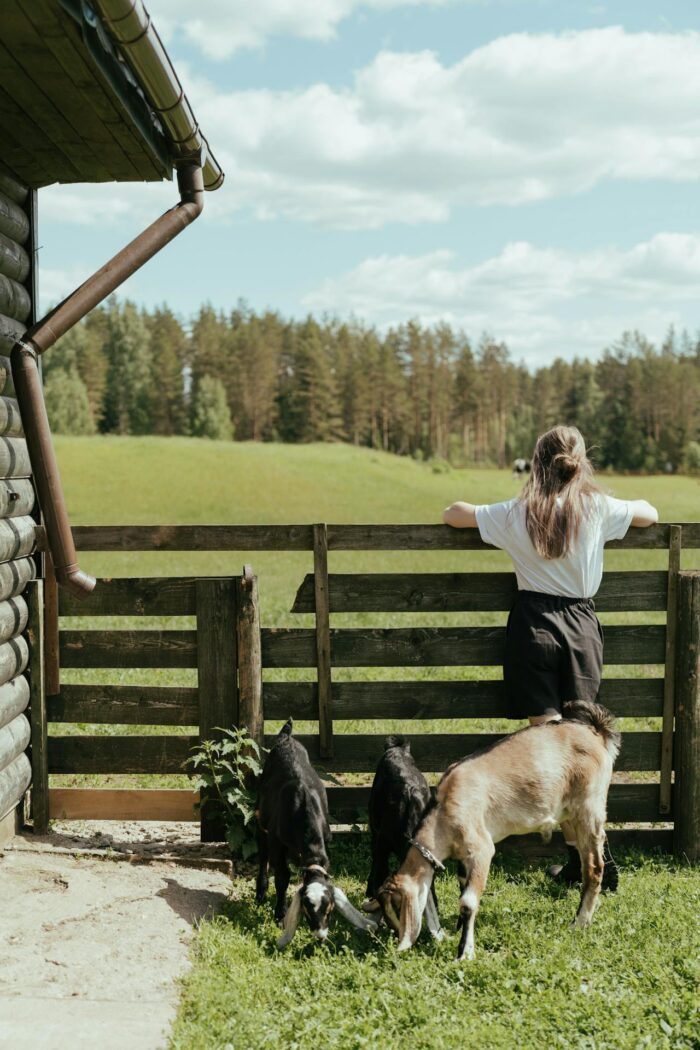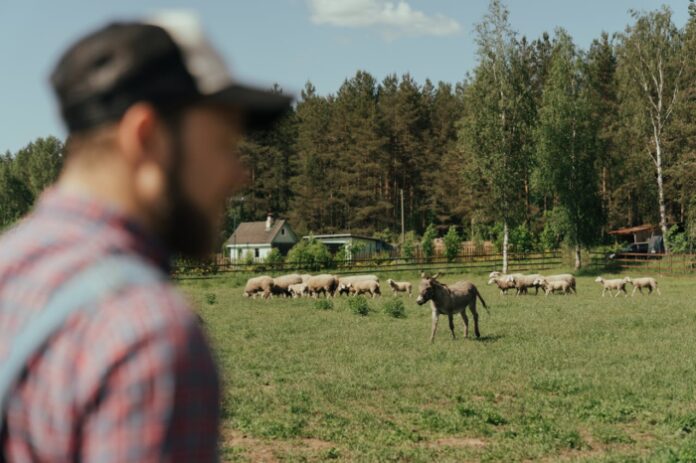The farming industry is one of the biggest climate polluters currently operating in the modern world. Everything involved in factory farming on a mass scale pumps millions of tons of carbon emissions into the atmosphere on a yearly basis.
Producing both meat and vegetables, flying products to new destinations to sell, and the current demand for farming that results from all kinds of diets has a huge impact on the environment. Multiple campaigns to demand better standards from the farming industry are currently underway, and signing up to support them counts as doing your bit for a green world.
But if you’ve got ample land to your property, there’s something else you can do as well: start homesteading and selling locally. You can make a good profit off of long-term homesteading activities. You can become self-sufficient in no time at all when you produce your own food and household items like soap, candles, and clothing.
This can save the environment a lot of trouble while making you a good bit of money; here are some of the main ways to manage both.

Why Homesteading Is a Smart Business Model in 2026
Homesteading is no longer viewed as a lifestyle hobby—it’s increasingly recognized as a legitimate home-based business model. Rising food costs, supply-chain disruptions, and consumer demand for transparency have shifted attention toward small-scale, locally owned producers.
In 2026, homesteading aligns with three dominant market trends: sustainability, local sourcing, and self-reliance. This combination makes homesteading uniquely positioned to generate recurring income while reducing environmental strain. For entrepreneurs seeking low-overhead, values-driven businesses, homesteading offers long-term resilience rather than short-term gains.
You Cut Your Household’s Carbon Footprint
Homesteading doesn’t only have the chance to make you money – it’s going to make your household much more green overall. Investing in this effort makes sense from both a business and a personal standpoint. If you’ve got the time and the space, a small-scale farming operation could make a very positive difference to your life overall.
In the US, the average household carbon footprint measures around 48 tons. This could be cut in half through homesteading efforts, especially if you have a larger family or require the use of more than one vehicle daily.
Through this link you’ll also see some stats on the way the farming industry contributes to overall global emissions. If these numbers worry you, growing your own food, collecting your own eggs, and then selling on any excess will make you a hardy part of the solution.
Homesteading Requires Sustainable Habits That Have Knock-On Effects
Being sustainable in the here and now means you’re going to be sustainable far into the future as well. In the business world, that’s currently at the prime point of the cultural zeitgeist. You can be part of the few enterprises that lead the way, and you’ll end up as the kind of business that the consumer can trust.
Far from the usual case of reducing and recycling as much as possible, homesteading requires you to learn how to take care of animals, learn to grow the crop back even bigger next year, and collect and reuse water.
These skills can be very simple to get to grips with, but hard to master without a bit of practice. However, the more you invest in them, the lower the cost of running your homestead will be. This can lead to a total net profit, as long as you decide this is the right kind of business for your goals and needs.
Skills That Increase Long-Term Homesteading Profitability
Beyond growing crops or raising animals, successful homesteaders develop transferable skills that compound income over time. These include soil regeneration techniques, compost management, rotational grazing, seed saving, and rainwater harvesting.
As these skills improve, operating costs decrease. Experienced homesteaders also gain the ability to teach others—opening opportunities for workshops, digital courses, and consulting. Knowledge itself becomes a sellable product, turning sustainability expertise into an additional revenue stream.
There’s a Low-Construction Impact
The construction industry can have a huge impact on the surrounding environment. Local communities can suffer a lot from the pollution output when a new building is going up. However, if you’re going to homestead using your own property lines, this impact won’t be a problem.
After all, you can invest in Pole Barns instead of a traditional barn build. If the animals you keep don’t need a permanent space all year round and simply need weather shade from time to time, this is a great alternative to keeping your livestock safe. If you’re worried about destroying local wildlife habitats, a simple structure like a pole barn is a much better option to invest in.
Of course, always double-check with your local authority before housing domestic livestock. Your area may have specific rules and it’s best to check with relevant rules before placing any money on the line.
You Can Diversify Your Products
A homestead doesn’t just produce one thing – it can produce over 10 different things at a consistent rate. What gets you into the farmers’ market with your own stall could one day lead to a full-on farm produce shop. It’s going to take at least a year to diversify properly, but it’s something you’ll need to plan for from day one.
So, think about this possibility when you curate ideas around your product line. Will you be willing to sell meat, or will you be vegetarian only? Will you sell animal-related products, such as wool and wax?
You could even offer experiences to families with young children akin to a day at the petting zoo, or tap into the therapy market with ‘cow hugging’ sessions. These are all popular choices for the current shopping generation!
The Market Wants Local Produce
It’s true! More than ever there’s a social conscience around where our food comes from and what it takes to grow, produce, and deliver it. But if you can provide a local option, and within that provide as much choice as possible, you’re going to be the first company they come to for their weekly eggs, broccoli, and chicken.
Make sure you advertise the fact that you’re producing locally and serving local people. This focus is very popular on social media right now and tapping into this could make you a huge chunk of money from the moment you think of it. Make content surrounding this regularly; take videos of your harvesting routine and take photos of your bedecked market stall, etc.
You Can Lead Your Community in Green Living
Green living is hard to focus on when you live a busy life and work a busy job. However, as a business that offers green living as the main product on their line, you could become the person they turn to for tips, tricks, and professional (and costly!) advice.
Homesteading leads the way in community initiatives. If your community has a lack of green spaces or focus on adapting green habits, you can bridge this very clear market gap. Take this into account when you’re building your homestead and deciding where to take it.
Indeed, this could even lead to consulting contracts with businesses throughout the local area. Offer services as a green working consultant using your hands-on experience and you may just get hired by those business owners who are similarly green-minded.
Working Green: Why a Homesteading Business Could Be Good For You
If you want to start your own business, homesteading might not immediately come to mind. However, if you’ve got the space for it, why not start up a homestead of your own? Providing good homes for livestock is a noble goal, but you can also make the environment around you a lot greener as you go.
For the modern entrepreneur, sustainability should be a top priority. And let’s not forget just how valuable a homestead can be. Startup costs can be mid-range to high, but the value paid back is becoming more and more evident. Animals and plant life can produce plenty to sell across the year; in the case of the latter, indoor farming may even be low cost and high profit!
Take all of this into account if you want your working future to be green. Working from home is already environmentally friendly, but it could even be greener if you put the space around you to good use.
Key Takeaway: Homesteading Combines Profit With Purpose
Homesteading proves that environmentally responsible businesses can also be financially viable. By reducing emissions, serving local markets, and diversifying income streams, modern homesteaders build resilient businesses that benefit both their communities and the planet.
FAQs
1. Is homesteading profitable as a home-based business in 2026?
Yes, homesteading can be profitable in 2026 when combined with local sales, product diversification, and digital income streams. Rising demand for organic, local, and sustainable products allows homesteaders to charge premium prices while keeping overhead costs relatively low.
2. How does homesteading help reduce environmental impact?
Homesteading reduces reliance on industrial farming, long-distance transportation, and excessive packaging. Growing food locally cuts carbon emissions, conserves water through reuse systems, and promotes sustainable land management practices that benefit the ecosystem.
3. What products sell best from a homesteading business?
Top-selling homestead products include fresh eggs, organic vegetables, honey, handmade soaps, candles, dairy products, and preserved foods. Many homesteaders also profit from value-added goods and educational services like workshops or digital guides.
4. How much land do you need to start homesteading?
You don’t need large acreage to start homesteading. Many profitable homesteads operate on less than one acre by focusing on intensive gardening, small livestock, vertical growing systems, and efficient space management.
5. Is homesteading suitable for beginners with no farming experience?
Yes, homesteading is beginner-friendly when started gradually. Many successful homesteaders begin with a few crops or animals, learn through practice, and scale over time using online resources, local workshops, and community support.
Find a Home-Based Business to Start-Up >>> Hundreds of Business Listings.















































